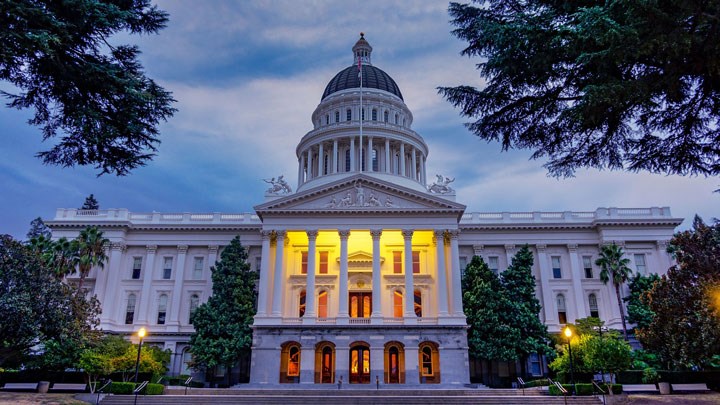
by Brian McCombie - Tuesday, August 11, 2020

What do certain California elected representatives know about African wildlife that actual African wildlife professionals and government officials do not? Quite a bit it appears if you take their word for it. Which may explain why the California legislature seems determined to put in place a ban on African hunting taxidermy that would only hurt—you guessed it—African wildlife and African wildlife conservation. Yet the bill, which the NRA and other hunter-backed wildlife conservation groups have stood against since its introduction in February, is being propelled through the California Legislature and is scheduled to be heard by the Assembly Appropriations Committee at 1 p.m.
This issue revolves around California Senate Bill (S.B.) 1175, the Iconic African Species Protection Act. Though touted by its supporters as a measure to save endangered African wildlife species, its real intent is to ban California hunters from possessing or importing 13 lawfully hunted African wildlife species. According to the California Legislature website, if made into law, the bill will “prohibit the possession of the dead body, or a part or product thereof, of specified African species including, but not limited to, the African elephant or the black rhinoceros, by any individual, firm, corporation, association or partnership within the State of California, except as specified for, among other things, use for educational or scientific purposes by a bona fide educational or scientific institution … .”
As the NRA Institute for Legislative Action (NRA-ILA) confirmed Friday, “The true goal of the bill is to ensure individuals are not allowed to bring home lawful hunting trophies—even with the approval of the U.S. government.”
In one of six letters to the bill’s originator State Sen. Stern (D-Calabassas) opposing the bill, NRA-ILA explained how Americans traveling to Africa to lawfully hunt benefit the local communities that rely on their funding for their wildlife conservation and anti-poaching efforts and economic health. It also explained that importing lawfully harvested wildlife from another nation is heavily regulated by the U.S. Fish and Wildlife Service (USFWS) under the Endangered Species Act of 1973 and through the Convention on International Trade in Endangered Species of Wild Fauna and Flora or CITES.
Instead of recognizing this process, S.B. 1175 bans the import of certain species with no consideration of conservation of the species. Further, because it conflicts with the Endangered Species Act (ESA), it would likely be ruled invalid by the courts if enacted into law. Of course, an invalid ruling would require a potentially lengthy and expensive lawsuit against the state of California for violating federal law—specifically the ESA.
Nevertheless, considering California’s noted anti-hunting climate, it was no surprise on Aug. 4 when S.B. 1175 sailed through the State Assembly’s Water, Parks, and Wildlife Committee en route to this afternoon’s Assembly Appropriations Committee hearing.
“From there, if approved, it would go to the Assembly Floor for a vote and if passed, it returns to the Senate, which already passed it, to make sure both versions of the bill match,” said Roy Griffith, the Legislative Director for the California Rifle and Pistol Association, the state’s NRA affiliate. “Then it goes to Governor Newsom for his signature or his veto. We are not expecting a veto.”
Due to the COVID-19 pandemic, Griffith noted, the majority of measures were stalled in the California Legislature including S.B. 1175. Until the bill’s sponsor revised the bill to make it appear to also be anti-COVID-19 legislation.
“It’s ridiculous,” said Griffith. “This bill has zero to do with stopping COVID-19, but the new Covid ‘language’ added worked to get the bill back on the legislative agenda.”
Safari Club International (SCI) has worked closely with NRA-ILA and CRPA on defeating this bill. As an SCI press release noted, Maxi Louis, the Director of the Namibian Association of Community Based Natural Resource Management Support Organizations, and George Pangeti, the former Director of Zimbabwe Parks and Wildlife Management Authority, were among those from Africa who testified before the Water, Parks, and Wildlife Committee in opposition to S.B. 1175, explaining why the proposed legislation was detrimental to conservation and the sustainable management of wildlife.
NRA Hunters’ Leadership Forum website contributor Catherine Semcer of the Property and Environment Research Center also was invited by the California Senate to testify before that committee. She explained that while the global tourism slowdown brought on by COVID-19 wreaks havoc on hunter-supported wildlife conservation efforts in Africa, hunting’s opponents are using the pandemic to justify increased restrictions on the importation of African hunting trophies in the name of limiting the spread of wildlife-based diseases. Semcer added that should the legislation become law it will create a disincentive for Californians to hunt in Africa, something likely to lead to decreased funding for habitat conservation and programs to combat illicit wildlife trafficking.
According to the California Legislature website, the following organizations and governmental bodies also have officially opposed S.B. 1175 as being detrimental to African wildlife:
A “Who’s Who” of California wildlife conservation and hunting organizations also oppose S.B. 1175, as does the Zoological Association of America.
With Election Day 2020 on the near horizon, it might do well for California hunters and conservationists to make their votes count for wildlife, not against it.
About the Author
NRAHLF.org contributor Brian McCombie is a field editor for the NRA's American Hunter and writes about firearms and gear for the NRA's Shooting Illustrated website. He is a member of the National Rifle Association and the National Shooting Sports Foundation. Brian likes hunting hogs, shooting 1911s chambered in 10 mm and .45 ACP, watching the Chicago Bears and relaxing with his two cats, Peanut Morgan and Simon.
E-mail your comments/questions about this site to:
[email protected]
Proudly supported by The NRA Foundation and Friends of NRA fundraising.
